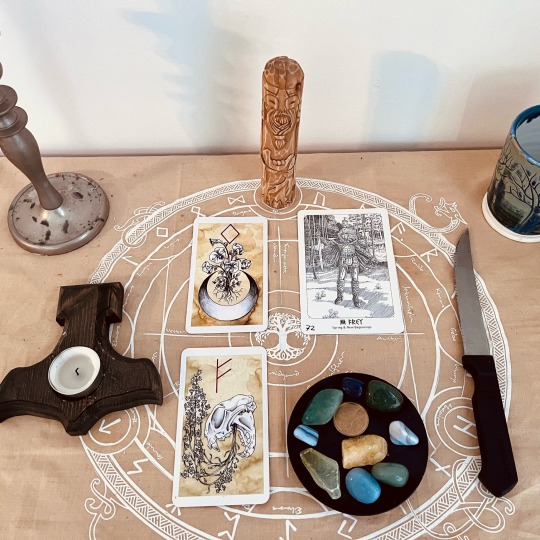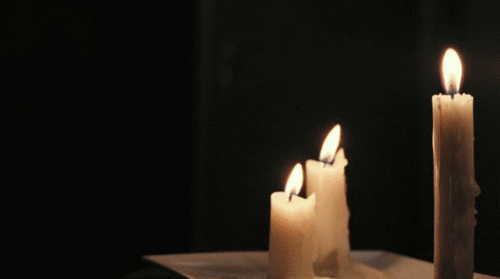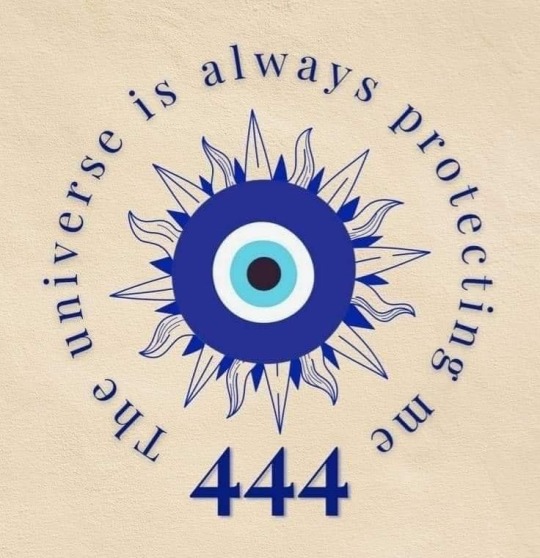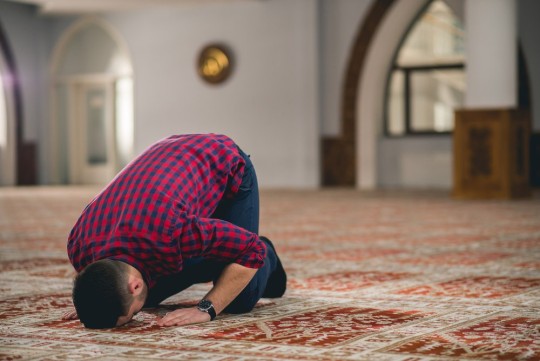#Heathenry
Text

Altar dedicated to Ingwe-Freyr 💚
(Rune cards by @thechaoticgingers )
#altars#freyr#norse pagan#heathen#norse polytheist#asatru#heathenry#pagan#paganism#norse paganism#germanic pagan#germanic paganism
43 notes
·
View notes
Text
Casual ways to connect with your deities
-Pray to them or just just talk with them and tell them about your day
-Light a candle and say your thanks
-Offer your meal/snack to them or bake/cook with them or for them
-Watch a movie in their honor
-Offer your morning drink to them or make a cup for them
-Assign them a plant and take care of it as a devotion to them
-Listen to music that reminds you of them
-Say good morning/good night
-Thank them for the things you see that you consider beautiful

#paganism#pagan#polytheism#hellenic polytheism#hellenic pagan#hellenic paganism#hellenism#kemetic#kemeticism#heathenry#heathenism#norse paganism#deity devotion#deities#deity#deity work
4K notes
·
View notes
Text
Quick reminder for both new pagans and experienced pagans: it's normal to not always feel a deity's presence, and it's normal even if you never feel their presence. You're not doing anything wrong.
#paganism#pagan#pagans of tumblr#pagan witch#paganblr#polytheist#polytheistic#polytheism#deity work#deity worship#deities#heathenry#hellenic pagan#hellenic polytheism#hellenismos#helpol#norse polytheism#norse pagan#norse paganism
2K notes
·
View notes
Text
worship evolves with time. yes, the people who worshipped the gods back in the day had specific offerings to be given. but what is stopping you from giving modern offerings? things around your house? offerings shouldn't have to cost you a fortune. your deities aren't holding you at gunpoint to only receive what you can't easily get. they are a means of showing your love in your day-to-day.
so yes!! give your deities candy bars! show them a silly little doodle of them in the corner of your notebook!! make a spotify playlist and play it for them!! dedicate a journal to them!! make a pinterest board and fill it with pins that remind you of them!!
the important aspect of these offerings is that you are thinking about your deities. thinking about them and feeling love and devotion to them is a means of offering! you are devoting your energy in these acts!!
#we are humans who evolve!! absolutely pay respects to the old ways but don't limit yourself!#deities are not trying to gobble ur wallet. do what u can <3#deity work#deity worship#paganism#heathenry#norse heathen#norse paganism#hellenic pagan#pagan witch#pagan#hellenic polytheism#norse polytheism
975 notes
·
View notes
Text

#witch#green witch#naturecore#freyja#heathen#heathenry#norse gods#goddess freya#pagan#chaos witch#witchcore#witchblr#witch community#ocean witch#baby witch#witchy#witchcraft#witches#witch aesthetic#water witch#spiritual#444#evil eye#the universe
2K notes
·
View notes
Text

Color Associations In Magick
Red - love, seduction, passion, strength, courage, charisma, assertiveness, survival, change, power
Blue - peace, communication, expression, forgiveness, traveling, protection, truth, sleep, patience, trust, pregnancy
Yellow - joy, abundance, intelligence, reason, learning, memory, inspiration, imagination, friendships
Green - growth, wealth, fertility, business, healing, nature, balance, luck, longevity
Orange - creativity, justice, ambition, opportunity, attraction, abundance, confidence, energy, celebration, goals, success
Purple - intuition, decadence, authority, wisdom, knowledge, influence, psychic abilities, devotion, enlightenment, overcoming fears, addiction, independence, spirituality
Pink - self-love, companionship, affection, spiritual healing, kindness, beauty, femininity, marriage, sensuality, children, healing abuse
Brown - home, animals, family, stability, endurance, grounding, solidarity, strength, hard work, earth
White - cleansing, purification, spirituality, higher-self, innocence, illumination, balancing, hope
Black - protection, binding, transmutation, banishing negativity, dignity, force, grief, secrets, endings, loss, security
Gray - stability, concentration, neutrality, reserve, balance, adaptability, flexibility
Gold - wealth, inner-strength, understanding, self-realization, sun, masculinity, abundance, happiness, overcoming addiction, luxury
Silver - wisdom, psychic powers, intelligence, memory, moon, healing, divination, money, femininity, fertility, hidden potential, success, awareness
#magic#magick#magical#magickal#witch#witchy#spells#spellwork#manifesting#manifestation#pagan#paganism#heathen#Heathenry#spell#baby witch#witchcore#witchcraft#witches#witchblr#witch community#cottage witch#green witch#hedge witch#eclectic witch#wicca#color magic#grimoire#book of shadows#wiccan
795 notes
·
View notes
Text
To those of you who worship obscure divinities: there are no rule that bind you except your own. Go worship that obscure deity. Go invent that festival from scratch. Go make that offering even if it’s unusual. Go write that prayer even if you’re the only one who gets it. Go play around with your freedom as a practitioner and explore! Even in a spiritual context, creativity is a gift.
#feel free to share obscure deities you worship!#thought#heathenry#spirituality#polytheism#paganism#norse paganism#deities#deity work#pagan#norse gods#witchcraft#norse polytheism
1K notes
·
View notes
Text
When people are like, "The gods won't help you with your problem! They're too important and busy for that!" I gotta wonder why they think people bothered interacting with deities in the past in the first place.
2K notes
·
View notes
Text
Hot take, apparently, but genuinely harassing or insulting anyone's religion is not ok.
Criticizing religious institutions, proselytizing, extremism, or horrible behaviors/beliefs done in the name of a religion? YES! Totally. That should be criticized.
Unpromptedly popping up on random posts by religious folks to say anything along the lines of "god isn't real", "the pagan gods are fake", "there is only one true religion", "[any religious group] are stupid/dangerous/barbaric" -- NO.
It's rude. It's unnecessary. And sometimes, especially in the case of minorities or oppressed groups, it's outright hateful. Theres nothing helpful, funny, or cool about randomly insulting one of the most personal aspects of a persons life. Unless it's invited or warranted, stfu.
#like please stop randomly telling me my gods dont exist#idc#atheist#christian#pagan#paganism#pagan witch#christian witch#evangelical#heathenry#witchcraft#deities#deitywork#ancient gods#religion#religious#religious joy#pagan joy
1K notes
·
View notes
Text

#heathenry#norse paganism#heathen#norse pagan#pagan#norse heathenry#norse heathen#inclusive heathenry#reproductive rights
1K notes
·
View notes
Text
May the Gods ease your gender dysphoria.
May they bless you with gender euphoria, and supportive friends and family.
May they guide you and help you on the path for your transition, no matter what form that may take.
#pagans of tumblr#pagan#paganism#paganblr#pagan witch#transgender pagan#trans pagan#nonbinary pagan#queer pagan#lgbt pagan#hellenic pagan#heathenry#hellenic polytheism#hellenismos#helpol#norse polytheism
516 notes
·
View notes
Text
i find it fascinating how my perception of the gods have changed once i met them. both in looks and personality.
Freyja, related to beauty, love and lust, i believed would look young and very feminine. Yet, when presented with her, she was a gorgeous, mature woman with lines at her eyes and a towering figure. The realization that a goddess I acknowledge as being so gorgeous had wrinkles and strong facial features made me reconsider my own perceived “flaws” and standards of beauty. She was beautiful in her strength and wisdom and yet also in her divinity and confidence. I had forgotten a woman of extreme beauty was also a goddess of war. And in both being true, I found her to be the most powerful woman I know.
Seeing Hades, I believed he would be fearsome and cold. Yet, when I looked into his eyes, there was warmth. He had an appearance of a man in his 40s with long hair, the color of the night, and he had no resentment or even disdain. Only softness. I didn’t fear him nor did he try to have me do so. He was safe as he led me through the courtyard where we met. Where I thought he would be an imposing and cold-hearted figure, I found someone with such patience like a father-figure would have.
Apollo, whom I thought would be bubbly and funny from how I’ve seen others described him was indescribably elegant. He carried himself well. He was kind and patient. Where I thought I would find youthful naivety, I found charm and elegance. And he only asked to help me in my healing. Even when I thought I did not need him, he waited patiently until I could hear him properly. And no matter how long it took, he was still welcoming with a smile.
I truly believe everyone should have the opportunity of meeting their deities and finding how they appear to them. What they show themselves as is what you may need. I find it fascinating to see how others see them :) They love us very much.
#deity work#deity worship#apollo deity#apollo worship#hades deity#hades worship#freya deity#freyja#freyja deity#freyja worship#hellenic polytheism#hellenic pagan#hellenism#hellenic deities#norse paganism#norse heathen#heathenry#heathenism#paganism#pagan witch
415 notes
·
View notes
Text

#witch#green witch#naturecore#pagan#heathen#heathenry#freyja#norse gods#goddess freya#witchblr#witch community#ocean witch#baby witch#water witch#witchcore#sea witch#witchy#witchcraft#witch aesthetic#witches#eclectic witch#hedge witch#male witch#pagan witch#witch blog#pagan lucifer#norse paganism#paganblr#wicca#wiccan
518 notes
·
View notes
Text
The Structure of a Pagan Prayer
When appealing to a deity or making an offering, it’s wise to know how this was traditionally done in the past so you can be as respectful as possible and build a true reciprocity with the gods. This type of prayer structure is found in all manner of pagan religions from Norse paganism, Hellenic (Greek) polytheism, Kemetic (Egyptian) prayer and so on. I got the inspiration and much of the information here from @Ocean Keltoi on Youtube who is a fantastic scholar and Norse heathen who actively stands against prejudice and is all around a wonderful resource.

Now, there are three main elements of a pagan prayer, which should be done in this order:
1. The Invocation. This is where you call upon the specific god you’re hoping to connect with. Think of it as writing the name and address on your letter to the Gods - it lets the deity know that this prayer is directed at them, which is important in a polytheistic religion with many gods. To start your invocation, address the deity directly by name, or use an epithet or kenning that they're known by. It's especially wise to choose an epithet that relates to what you're praying for, like using one of Apollo's healer epithets while addressing him in a prayer about a loved one's sickness, for instance. It’s also a good idea to praise them highly and with a certain air of reverence. These are ancient deities after all.
2. The Argument. Here you give your reasons for why a deity should fulfill your request and favor you. If you’ve brought offerings, cite them here. You can also include reasons for why you’re reaching out, such as love in a prayer for Aphrodite or matters of justice with the god Tyr. This is where you make your case to them. And if you’re reaching out to a deity you don’t have a working relationship with, which let’s be honest will be the case many more times than we’d like, then you can tell them this here also. A good example might be “Oh Tyr, one-handed war god and son of Odin, though we have not met before I have heard your name and been called to it…”
3. The Request. Finally you ask the gods to look kindly on your request and to grant you their blessing. Again, be as respectful and reverent as possible towards them.
Prayer Example: “Grey-eyed Athena, daughter of thundering Zeus, if ever I have poured out sweet wine for you, look kindly on me and grant me your wisdom.”

How to stand when making the prayer
This depends on which God you’re reaching out to and, of course, your own personal comfort. The most common ways of praying are to stand and perform some gesture of reverence, kneel while praying and even prostrate, kneeling fully on the ground with your head down as you appeal to the gods. Some might also choose to wear veils when performing prayers or rituals for deities, though this is naturally up to the individual.
In Hellenic tradition, if you’re praying to an Ouranic god (deities of the heavens) you would traditionally wear your hair up and stand with your arms raised to the heavens while reciting your prayer. Meanwhile, if you are praying to a Chthonic god (deities of the underworld), you would kneel and face downwards towards the Earth with your hair flowing freely.
Some Norse sources tell of ancient pagans prostrating before the gods, and yet this is still not entirely necessary. Pray however you see fit and what is most comfortable for you at the moment.

^ This is what prostrating looks like
Sources:
Ocean Keltoi's video on pagan prayers
Hearth and Fire Work's blog post on Hellenic prayer structure
#witchblr#witchcraft#witch tips#deity work#paganism#pagan#polytheism#hellenic pagan#hellenic paganism#hellenic polytheism#norse pagan#norse heathen#norse paganism#heathenry#kemetic paganism#kemetic pagan#celtic pagan#celtic paganism#spirit work
877 notes
·
View notes
Text
Berserkers, or—as we say, per the traditions of the Old Ways—"tactical furries."
809 notes
·
View notes
Text
Please do not be afraid to reach out to a deity. Don’t hesitate to pray to a God who you know could help out, even if you’ve never worked with them before. You don’t need a deep understanding of them to ask for their help. It’s okay to reach out: it can turn out profoundly fulfilling.
#thought#sleep well all!#heathenry#polytheism#norse paganism#paganism#spirituality#norse gods#deity work#deities#norse polytheism
1K notes
·
View notes